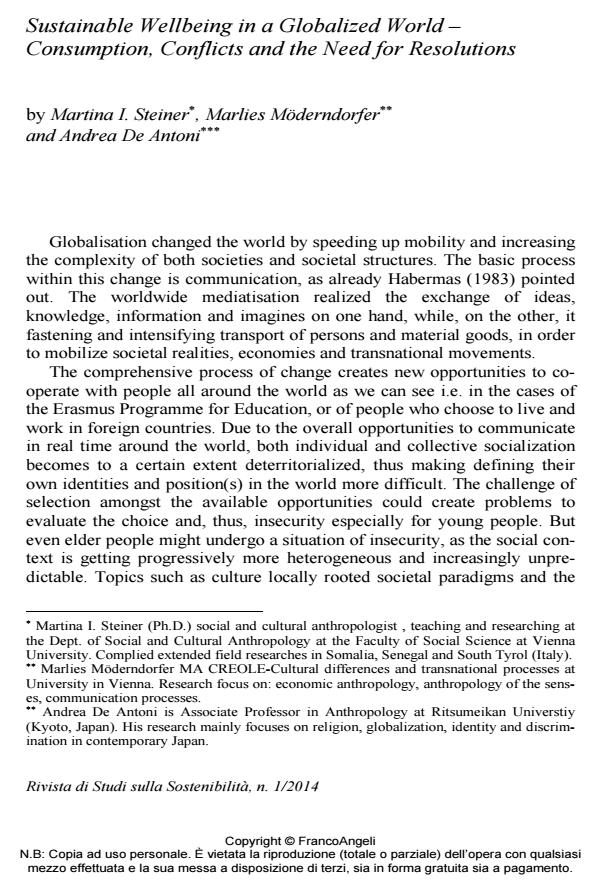Sustainable Wellbeing in a Globalized World - Consumption, Conflicts and the Need for Resolutions
Titolo Rivista RIVISTA DI STUDI SULLA SOSTENIBILITA'
Autori/Curatori Martina I. Steiner, Marlies Moderndorfer, Andrea De Antoni
Anno di pubblicazione 2014 Fascicolo 2014/1 Lingua Inglese
Numero pagine 23 P. 125-147 Dimensione file 201 KB
DOI 10.3280/RISS2014-001008
Il DOI è il codice a barre della proprietà intellettuale: per saperne di più
clicca qui
Qui sotto puoi vedere in anteprima la prima pagina di questo articolo.
Se questo articolo ti interessa, lo puoi acquistare (e scaricare in formato pdf) seguendo le facili indicazioni per acquistare il download credit. Acquista Download Credits per scaricare questo Articolo in formato PDF

FrancoAngeli è membro della Publishers International Linking Association, Inc (PILA)associazione indipendente e non profit per facilitare (attraverso i servizi tecnologici implementati da CrossRef.org) l’accesso degli studiosi ai contenuti digitali nelle pubblicazioni professionali e scientifiche
The accelerated process of globalization has dramatically changed social structures and, consequently, practices. This demographic dynamic creates heterogeneous realities, that require adaptation of communication paradigms, social interaction and cooperation, in order to develop new sustainable models of coexistence that can create a basis for well-being. In order to achieve this purpose, it is fundamental to guarantee fundamental rights for everyone, in particular a healthy sustenance, consumed in an enjoyable socio-cultural environment.
Il processo accelerato di globalizzazione ha cambiato drammaticamente le strutture e con ciò le pratiche sociali. Questa dinamica demografica costituisce delle realtà eterogenee, che necessitano un adattamento di paradigmi di comunicazione, interazione e cooperazione per creare nuovi modelli di convivenza sostenibili che possano creare una base di benessere. Per raggiungere questa meta è indispensabile garantire i diritti fondamentali per tutti, soprattutto un’alimentazione sana consumata in un ambiente socioculturale piacevole.
Keywords:Comunicazione, interazione, cooperazione, nuovi modelli di convivenza sostenibile, benessere, diritti fondamentali
- Appadurai A. (1996). Modernity at Large: Cultural Dimensions of Globalization, Minneapolis (MN): University of Minnesota Press.
- Ashley B., Hollows J., Jones S., Taylor B. (2004). Food and Cultural Studies, London and New York: Routledge.
- Bourdieu P. (1984). Distinction: A Social Critique of the Judgement of Taste, London/New York.
- Brah A. (1996). Cartographies of Diaspora. Contesting Identities, London-New York: Routledge.
- Carley M., Spapens P. (1998). Sharing the World. Sustainable Living & Global Equity in the 21st Century, London: Earthscan.
- Clark D. (2008) (1997). The Raw and the Rotten: Punk Cuisine. In Counihan C., van Esterik P. (Eds.), Food and Culture. A Reader, 2nd Edition, London-New York, Routledge: 411-422.
- Dabringer M. (2009). Konsumieren in global-lokalen Kontexten. Zur Verortung eines sozialen Phänomens, SWS-Rundschau, 49.Jg., Heft1/2009: 6-28.
- Frost N. (2008). Food, Culture & Society, Jun, 11(2): 173-189, DOI: 10.2752/175174408X317552
- Gupta A., Ferguson J. (2002). Spatializing States: Toward an Ethnography of Neoliberal Governmentality. American Ethnologist, 29(4) Nov.: 981-1002, DOI: 10.1525/ae.2002.29.4.981(http://www.jstor.org/stable/3805165)
- Gupta A., Ferguson J. (Eds.) (1997). Culture, power, place : explorations in critical anthropology, London: Duke University Press: 1-32, DOI: 10.1215/9780822382089
- Habermas J. (1983). Moralbewußtsein und kommunikatives Handeln. Frankfurt am Main.
- Hannerz U. (1992). Cultural Complexity. Studies in the Social Organization of Meaning, New York: Columbia Press.
- Hannerz U. (1996). Transnational Connections – Culture, People, Places, London: Routledge.
- Inda J.X., Rosaldo R. et al. (2002). Globalisation. A reader, Oxford: Blackwell.
- Jayne M. (2006). Introducing cities and Consumption. In Cities and Consumption, (Routledge Critical Introductions to Urbanism and the City), London-New York: Routledge: 1-24.
- Jayne M. (2006a). Consumption an Everyday Life. In Cities and Consumption, (Routledge Critical Introductions to Urbanism and the City), London-New York: Routledge: 93-118
- Le Monde Diplomatique (Ed.) (2003). Atlas der Globalisierung. taz Verlags- und Vertriebs GmbH.
- Maslow A. (1954). Motivation and Personality, New York: Harper.
- Nichter M. (2008). Coming to our senses. Appreciating the sensorial in transkultural psychiatry. Transcultural psychiatry, McGill University, Sage Publications, 45(2): 163-197.
- Pitasi A. (2012). Ipercittadinanza, strategie sistemiche e mutamento globale, Milano: FrancoAngeli.
- Reder M., Pfeifer H. (2012). Kampf um Ressourcen. Weltordnung zwischen Konkurrenz und Kooperation, Stuttgart: Verlag W. Kohlhammer.
- Rojzman C. (1999). La peur, la haine et la démocratie, Paris: Desclée de Brouwer, coll. “Provocation”.
- Sage C. (2011). Envrionment and Food, New York: Routledge.
- Schmidt G. (2005). Positive Ecology: sustainability and the good life, Burlington: Ashgate.
- Sen A. (1999). Development as Freedom, New York.
- Seyfang G. (2009). The New Economics of Sustainable Consumption. Seeds of Change, Hampshire: Palgrave Macmillan.
- Sharma A., Gupta A. (Eds.) (2006). The Anthropology of the State: A Reader, Oxford: Blackwell.
- Wiekhorst A. (2007). Einführung in die Medizinanthropologie. Institut für Völkerkunde, Albertus Magnus-Universität zu Köln.
- OECD Working papers on international migration after the financial crisis: http://www.oecd.org/els/mig/Adjustment-mechanism.pdf.
Martina I. Steiner, Marlies Moderndorfer, Andrea De Antoni, Sustainable Wellbeing in a Globalized World - Consumption, Conflicts and the Need for Resolutions in "RIVISTA DI STUDI SULLA SOSTENIBILITA'" 1/2014, pp 125-147, DOI: 10.3280/RISS2014-001008